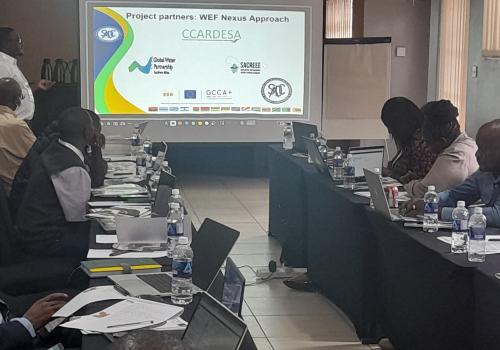A week-long regional training of trainers’ workshop to build capacity on Climate Smart Agriculture (CSA) technologies that the Centre for Coordination of Agricultural Research and Development in Southern Africa (CCARDESA) has been promoting in the Southern African Development Community (SADC) Region in collaboration with its partners, began in Harare, Zimbabwe, on 20th March 2023.
Participants from Malawi, Namibia, Zambia and Zimbabwe, as well as representatives from the Intra-African Caribbean and Pacific Global Climate Change Alliance Plus Programme (GCCA+), Consultative Group on International Agricultural Research (CGIAR), and Accelerating Impacts of Research Climate Research for Africa (AICCRA) implementing countries are attending the workshop.
The overall objective of the workshop is to train trainers on CSA and tools that have been developed by CCARDESA and its partners to ensure mainstreaming to other SADC Member States to enhance more effective contributions towards resilient food systems in Southern Africa. The workshop aims to strengthen the capacity of Member States to implement commitments taken under the Paris Agreement, mainstream climate adaptation and mitigation in national sector strategies and to access finance to lessen the impact of climate change.
In his opening remarks, CCARDESA programme officer, Mr Bartholomew Chataika, said climate change cannot be over-emphasised as its impact on agricultural productivity is a major concern in SADC, adding that Cyclone Freddy that devastated Malawi and Mozambique in March 2023 should be a wake-up call for the Region to take action and effect policies that have long term effects in mitigating climate change.
Through the training workshop, CCARDESA and its partners such as SADC Centre for Renewable Energy and Energy Efficiency (SACREE), Ground Water Partnership Southern Africa (GWPSA) and Southern Africa Regional Universities Association (SARUA), seek to capacitate the Region to adapt to climate change and improve adaption.
Mr Chataika said one of the major focus areas of GCCA+ is to promote CSA by devolving sufficient knowledge products and disseminating them in the Region, and the media is key in this regard as SADC has made it a point that whatever is done is disseminated to its citizens.
The workshop is expected to enhance CSA capacities in Member States; result in a better understanding of principles and practices of high value horticulture vegetable production; better understanding of the Water, Energy and Food security nexus model in relation to importance of agriculture; address entrepreneurship, leadership and gender issues; as well as advisory services and CSA products to support decision making and spill-over to SADC to countries.
The workshop will unpack CSA and explore options for selected value chains; enhance understanding on the horticultural vegetable value chain; and familiarise participants with the Water, Energy Food nexus model with emphasis on different irrigation systems, water harvesting, and water use efficiency practices. Participants will explore entrepreneurship, leadership and gender issues for consideration under climate change and CSA; and disseminate advisory services tools to support decision making and enhance uptake by spill over countries in Southern Africa.
During the workshop, there will be a combination of presentations, plenary discussions, group work and a field visit to appreciate CSA activities under the GCCA+ project being implemented in Rushinga district in north-eastern Zimbabwe.
After the workshop, it is expected that capacity of national partners to deliver CSA trainings to GCCA+ and AICCRA project beneficiaries will be improved; understanding of the principles and practices of high value horticultural vegetable production will be enhanced; and there will be better understanding of the WEF nexus model in the implementation of irrigated agriculture.
About stakeholders
GCCA+ is a European Union funded programme that seeks to strengthen the capacity of SADC Member States to undertake regional and national adaptation and mitigation actions in response to the challenges caused by the effects of global climate change, while AICCRA works to scale CSA and climate information services that reach millions of smallholder farmers in Africa. CGIAR is a strategic partnership of diverse donors that support 15 international centres, working in collaboration with many hundreds of government and civil society organisations as well as private businesses around the world
For further information contact Bartholomew Chataika on Bchataika@ccardesa.org or +264 81 331 6996.

